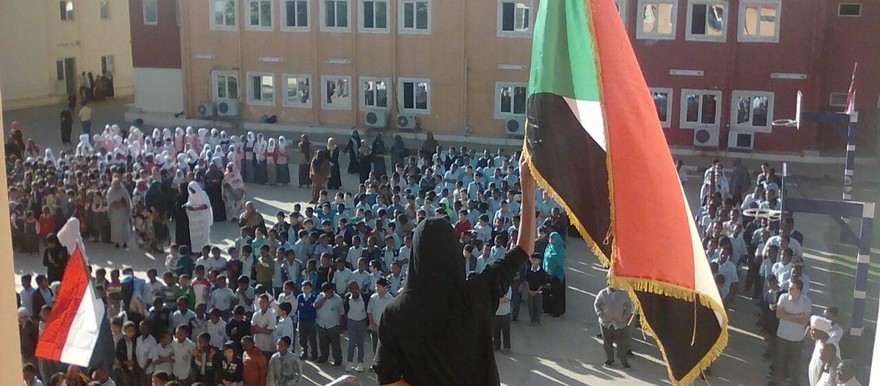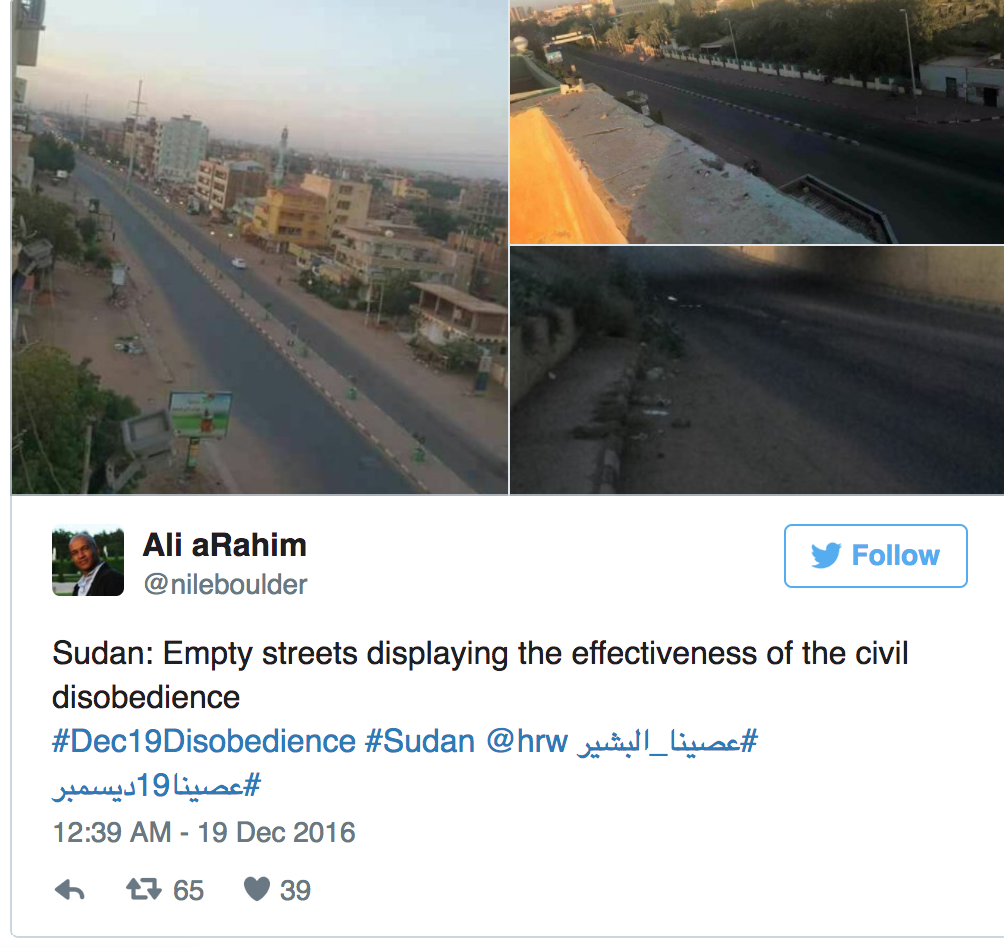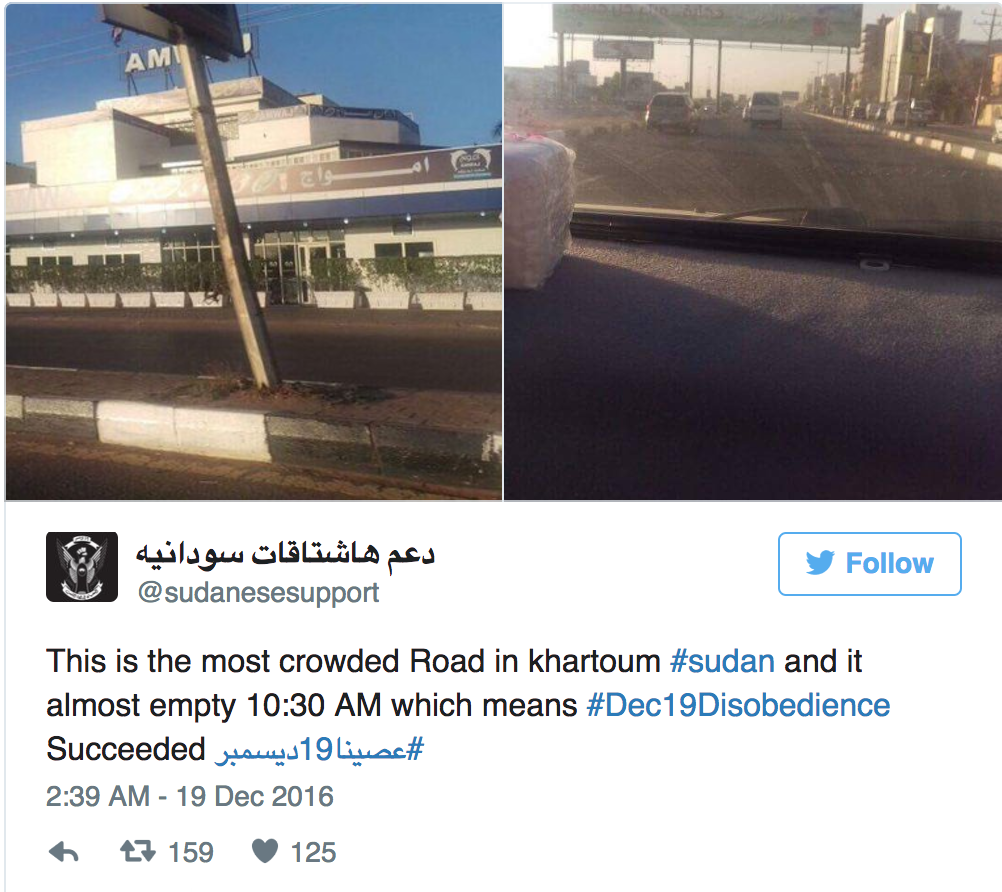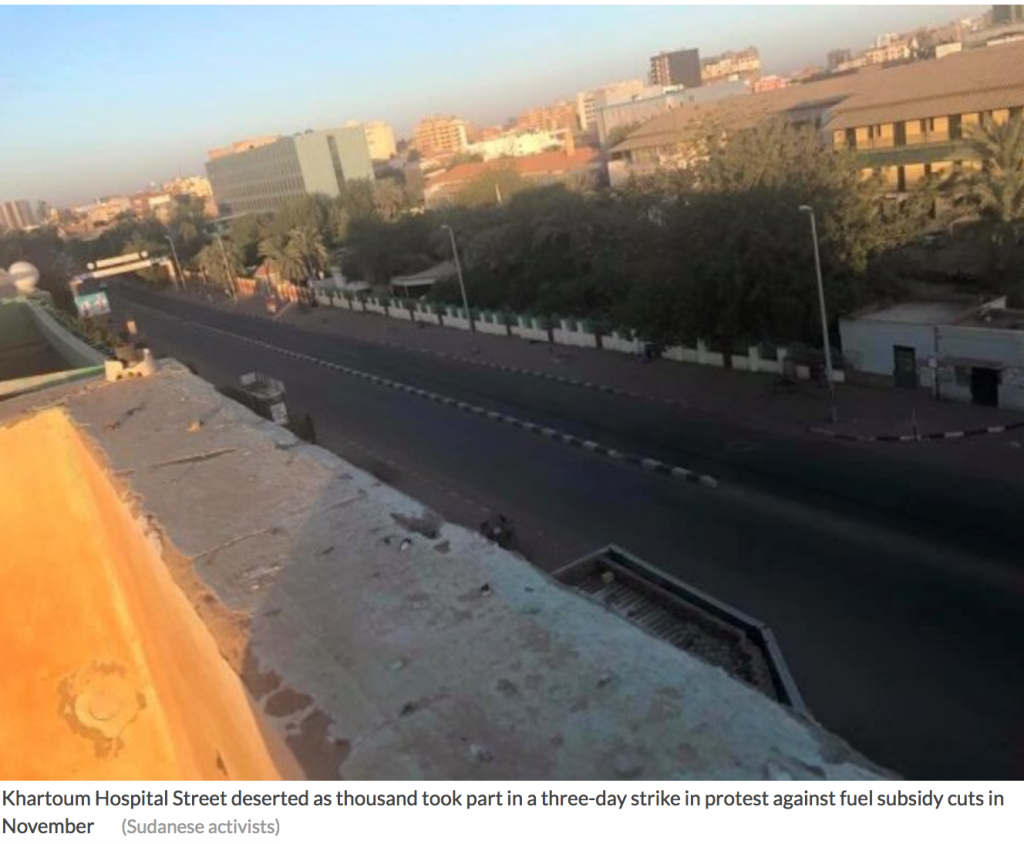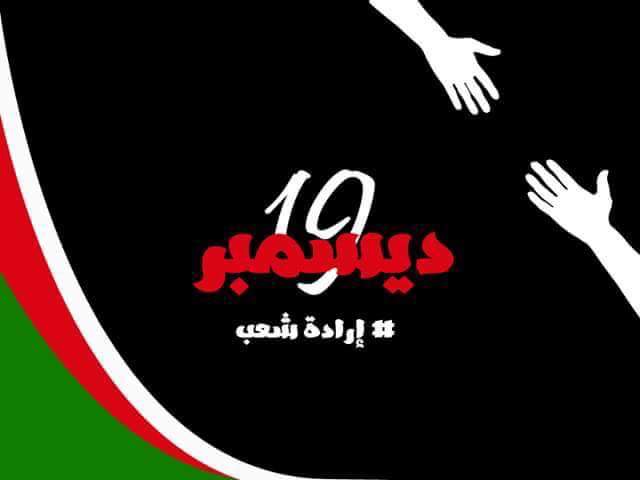Sudan’s December 19 Civil Disobedience: Updated news
#عصينا19ديسمبر
#Dec19Disobedience
Eric Reeves | December 20, 2016 (1:30pm GMT) | http://wp.me/p45rOG-1Zq
This is a running blog account of what has been reliably reported from Sudan about the events and developments leading up to December 19, 2016 and beyond; Twitter reports (links) may be found at @SudanReeves. A compendium of the relevant dispatches over the past month from Sudan Tribune and Radio Dabanga is provided below, with links to particular topics.
The success of the general strike was partial, largely because of the threats and actions by the regime. The primary tactic—participating in the strike by staying home—gave little chance to al-Bashir and the Khartoum regime to put in play “shoot to kill” orders of the sort issued in September 2013. Even so, I have posted a great many photos from Khartoum and elsewhere that indicate empty streets and a lack of activity.
The question then, of course, is how Sudanese civil society decides to do next. Yesterday’s strategy seems a wise first step; but by itself, other than showing Sudanese that they stand in solidarity against the regime, it is not enough. More vigorous non-violent protests, strikes, and other refusals to comply with the regime’s orders will be needed.
What they will be is for the Sudanese people to decide.
UPDATE #4: December 20, 2016 (1:30 pm GMT)
[1] Amnesty International Urgent Action | https://www.amnesty.org/en/documents/afr65/5293/2016/en
Amnesty International has released an updated Urgent Action on individuals in NSS detention.
Two of the 30 men who had been in arbitrary detention in the prison at the National Security Service (NSS) headquarters were released. At least five more were detained, but one of them was released on 17 December. There are currently at least 32 men arbitrarily detained in the NSS prison.
A total of at least 32 men arrested during different times since January 2014 are in arbitrary detention in the National Security Service (NSS prison). Most are accused of having some affiliation with the Sudan People’s Liberation Movement-In Opposition (SPLM/A-IO), but none has been charged with any offence. They have been denied the right to be brought promptly before a judge and the right to challenge the lawfulness of their detention. Some of these detainees are being held incommunicado, without access to family members or a lawyer.
[2] Another excellent overview from Radio Dabanga, looking at the successes and disappointments in the general strike; the dispatch makes clear extensive other tactics used by the regime to threaten, intimidate, and undermine civil society actions:
Employees, shop owners threatened on Sudan’s ‘strike day’ | Radio Dabanga |December 20, 2016 | SUDAN
On Monday, Sudan witnessed varying responses to the calls for a nationwide civil disobedience action against the recent austerity measures and the government policies. The authorities of various states in the country reacted to the civil strike by forcing people not to join in.
In Zalingei, the capital of Central Darfur, absent government employees were threatened with dismissal,” the Central Darfur camps coordinator told Radio Dabanga. “As for the shops and markets, the authorities suddenly took the decision to fine shop owners if they would not open the doors on Monday,” he reported. “Every shop or stall that was closed because of the civil disobedience action, would be marked with red paint and barred with locks. The owner then would have to pay SDG500 ($77) to get his shop unlocked.
“Most merchants strongly disapproved the measures, but had to open their shops and stalls in this way”. The coordinator added that most of the displaced people in the camps stayed at home.
The students of “some schools” stayed at home, an activist said. He further noted sporadic demonstrations by secondary school students that were dispersed by the police using tear gas.
A South Darfur government employee told this station on Monday that they were forced by the authorities to appear at their work. “They threatened us with dismissal if we would stay at home. Today we had to sign for our presence.” Civil society organisations in the city launched balloons in the sky in support of the civil strike.
In North Darfur, the people were warned through Radio El Fasher on Monday morning not to participate in the civil disobedience action. An activist reported that the leaders of the National Congress Party (NCP) in the North Darfur capital of capital El Fasher mobilised the party’s affiliates among the state government employees. “They told them to check on colleagues who remained absent from work, and tell them they would be threatened with dismissal,” she said.
She added that the NCP Youth Union posted pamphlets on walls in the town, condemning the civil disobedience action, and telling the people to stay aloof.
The source further said that the security forces in the North Darfur capital were prepared to counter riots. “At a certain moment, police forces surrounded the Darfur Secondary School, where students were chanting slogans against the government. They also blocked the El Fasher University campus in anticipation of riots.”
Most of the shops in El Fasher remained shut during the day. The Grand Market of El Fasher stayed closed until 12am. Public transport also did not work in the morning. El Shafee Abdallah, leading member of the Darfur Camps Coordination Body told Radio Dabanga that the schools, health centres, and shops remained closed during the entire day in the Zamzam camp south of El Fasher, which hosts more than 125,000 displaced.
Photographers deployed
Multiple sources reported from various West Kordofan towns that the authorities “did everything to hamper the civil disobedience action”. In the capital El Fula, government employees were sent to the localities “to check the presence of their colleagues at their offices,” one of them said. The activists all pointed to a heavy deployment of security and police forces, as well as a number of “government-affiliated photographers” at the town markets. Asked about the success of the civil strike in West Kordofan, the sources said that it succeeded by 50 per cent. “The response was low in comparison to the efforts made in preparation, but the action nevertheless terrorised the government and its various organs,” one of them noted.
Atbara
There was much less traffic than usual in Atbara in northern Sudan on Monday. Listeners reported from the former centre of the country’s railway industry and trade union stronghold that the response to the disobedience calls was higher than during the former civil strike in end November. “A number of stores and schools kept their doors shut,” one of them said. Other schools closed later on the morning as the students declined to come, defying threats that they would be expelled if they would stay at home. The government employees, however, appeared at their offices as usual, as they were threatened as well.
‘Partial response’
The responses in the eastern Sudanese towns of Port Sudan, Kassala, and El Gedaref were mixed. “Many university and secondary school students declined to leave their homes, but life in the port and government departments continued as usual”, a resident of Port Sudan told Radio Dabanga. He attributed the poor response of the port workers to the disobedience calls to the fact that the workers received their wages per working day. A resident of El Gedaref reported that the people in El Gedaref “only partially joined the civil strike. Though the traffic was as usual, the university and a number of schools closed their doors.”
He added that security agents arrested Ramzi Yahya and Abdeldayem Khidir from the office of the Shoroug Cultural Club on Sunday morning. An activist called Abdelgeyoum was detained that evening.
[3] PHOTOGRAPHS:
UPDATE #3: DECEMBER 19, 2016 | 4:15pm GMT
Excellent overview of December 19 in historical context:
Photograph from Khartoum today (December 19)
Sudan Feature: Does today’s Civil Disobedience represent a popular uprising? | Radio Dabanga | December 19, 2016 | DABANGA SUDAN
Whether the 19 December Civil Disobedience actions in Khartoum will shake the ruling power and have an effect on the recent austerity measures or not, from a historical perspective today’s mass strike resembles protests which twice ousted military presidents in the country’s past.
Today, a large number of Sudanese political forces and civil society members, as well as displaced people in camps in Darfur, plan to show their full support to the civil disobedience action. Photos of empty streets circulating on social media today, under the hashtag #Dec19Disobedience, conclude two weeks of buzz about the strike but 19 December is most likely not the last day Sudan will witness protests.
The current civil disobedience actions are the response of Sudanese people against austerity measures implemented in November. So far it has led to huge increases in prices of fuel, electricity, food, and medicines – sparking discontent among the Sudanese. During a civil strike against the measures from 27 to 29 November, the streets of Khartoum also remained quiet as many shop owners kept their doors closed and people stayed at home.
A prominent role in the protests is played by social media as activists use the channels to mobilise and safely coordinate their actions. While President Omar Al Bashir, in seat for 27 years, is downplaying the role of “keyboard activists” in the current protest actions, Sudan has showed in the past that widely supported actions of civil disobedience can usher in a significant change for its politics.
[ continued: https://www.dabangasudan.org/en/all-news/article/sudan-feature-does-today-s-civil-disobedience-represent-a-popular-uprising ]
UPDATE #2: December 19, 2016 | 2pm (Greenwich Mean Time/GMT; all times when possible will be give in GMT)
PHOTOS FROM SUDANESE ON TWITTER (GMT):
Sudanese set fire to govt. buildings in North Kordofan | Radio Dabanga | December 19, 2016 UMDUM HAJ AHMED People in Umdum Haj Ahmed in North Kordofan ignited the locality buildings on Saturday, in protest against the detention of a student from the area by agents of the National Intelligence and Security Service (NISS).
Family of detained Sudanese human rights defender concerned about his safety | Radio Dabanga | December 19, 2016 | KHARTOUM The family of the well-known Sudanese human rights defender Dr Mudawi Ibrahim, who is being held incommunicado by the National Intelligence and Security Service (NISS) expressed…
Sudanese in diaspora support #Dec19Disobedience | Radio Dabanga | December 19 – 2016 WASHINGTON / LONDON / PARIS / CAIRO A number of cities in the world witnessed demonstrations of Sudanese over the weekend, in support of the civil strike in Sudan planned for today. Activists in the country have…
Sudanese government says civil disobedience “big zero” while detentions of opposition figures continue | Sudan Tribune | December 18, 2016 (KHARTOUM) – Several Sudanese officials have downplayed the December 19th civil disobedience describing the general strike as “big zero” and “nonsense.”
African human rights body urges Khartoum to free three Sudanese defenders | Sudan Tribune | December 17, 2016 (KHARTOUM) – The African Commission on Human and Peoples’ Rights (ACHPR) this week condemned the arrest of several Sudanese human rights defenders and urged Khartoum to free (…)
Mass detention campaign in Sudan prior to civil strike | Radio Dabanga | December 18, 2016 | SUDAN The Sudanese authorities pre-empted the announced civil disobedience campaign on Monday with mass arrests of activists in the country.
Sit-at-home strike against fuel subsidy cuts begins in Sudan Workers urged to stay at home in protest against economic hardship following fuel price hike | International Business Times | December 19, 2016 09:39 GMT
Khartoum Hospital Street deserted as thousand took part in a three-day strike in protest against fuel subsidy cuts in November. A sit-at-home strike against fuel subsidy cuts is taking place in Sudan. Activists and opposition called on workers to stay at home on Monday (19 December) as part of what they call a “civil disobedience movement”.
A similar strike occurred in November, when opposition groups and activists called for a three-day “civil disobedience”, prompted by the government’s decision to increase petrol and diesel prices by 30% earlier this year. The move led to the rise in the cost of goods including medicines and public transport.
Sudan activists launch national disobedience campaign | Indepedent ON-line (South Africa) / 19 December 2016
Johannesburg – Sudanese political activists launched a civil disobedience campaign on Monday to protest Khartoum’s recent austerity measures and its crackdown on civil liberties. Opposition activists and military groups expressed support for a general strike and called on their supporters to play their part and support the campaign.
The planned campaign followed on the heels of a previous three-day civil disobedience campaign in late November, the Sudan Tribune reported on Sunday.
Mass detention campaign in Sudan prior to civil strike | Radio Dabanga, December 18, 2016
*
From Sudan Tribune and Radio Dabanga over the past month:
*
I. SUDANESE POPULAR SUPPORT FOR CIVIL SOCIETY ACTIVISM—WIDESPREAD AND DIVERSE | http://wp.me/p45rOG-1Zh
*
II. NEWSPAPER CLOSURES AND NEWS MEDIA REPRESSION | http://wp.me/p45rOG-1Zj
*
III. ARRESTS OF HUMAN RIGHTS ACTIVISTS AND JOURNALISTS IN SUDAN OVER THE PAST MONTH | http://wp.me/p45rOG-1Zl
*
IV. THE RESPONSE TO GROWING CIVIL UNREST BY THE NIF/NCP REGIME | http://wp.me/p45rOG-1Zn
*
V. THE SHAMBLES THAT PASSES FOR THE “SUDANESE ECONOMY” CONTINUES ITS FREE-FALL | http://wp.me/p45rOG-1Zp
VI. THE RESPONSE OF THE INTERNATIONAL COMMUNITY | http://wp.me/p45rOG-1ZO
